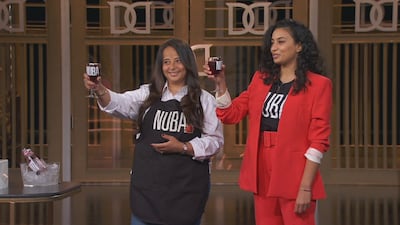When an Egyptian mother and daughter emigrated to Canada 10 years ago, they took with them one of their most cherished memories of home — special herbal drinks from the Middle East.
From brewing hibiscus and other infused drinks to share with their new neighbours in Toronto, Amal Soliman and Logaina El Kattan are now taking their beverage operation, Nuba, to the next level after winning C$75,000 in backing from business reality-TV show Dragons' Den.
Ms Soliman and Ms El Kattan started Nuba in 2018, producing quintessentially Middle Eastern drinks, including hibiscus, carob, tamarind, doum and qamar al din, selling them online and in select stores across North America.
“Egyptians know how ubiquitous these drinks are in our neck of the woods,” Ms El Kattan tells The National. “When we moved to Canada, we were so removed from our home and all the things we didn’t realise gave us comfort and safety.”
“My mum had brought some hibiscus flowers with her and we brewed a pot. It was like a taste of home in this new country that we hadn’t quite figured out how to navigate yet.”
Soon after their move, the mother and daughter duo shared their tisane drinks with their neighbours, as a way to bring a bit of their heritage to the cultural patchwork quilt that is Toronto.
Tisanes are beverages made by infusing herbs, spices or other plant material in hot water.

“People really loved the drinks. The response we got was overwhelming. We began to think that we could turn this into something bigger,” says Ms Soliman, who has a doctorate in agriculture and 20 years' experience in food processing.
Although she spent most of her early years in the Mediterranean city of Alexandria, where she lived in a large house with her parents, brother and extended family, Ms El Kattan’s family roots go back to Nubia, a region in southern Egypt which is the namesake of the brand.
Nubians are an ethnic minority in Egypt who speak their own language and have a culture that is distinct from the rest of the country.
All the brand’s plant materials are supplied by small-scale Nubian farmers, an aspect of the business that is close to the hearts of mother and daughter.

“This business is a way for us to pay homage to our home and the wonders that it possesses,” says Ms El Kattan. “Since our inception, we have worked with Nubian farmers who supply the hibiscus flowers for our drinks. We helped them modernise their growing techniques and open new markets for their produce.”
Ms El Kattan, a graduate of the University of Toronto’s business school, is now in the process of acquiring a master’s degree in business administration from Duke University in the US.
They received rave reviews from everyone who tried their products, says Ms El Kattan, but it was clients with cultural roots in the Arab world who were most taken with Nuba's drinks.
Ms Soliman recounts when a Palestinian woman tried Nuba’s carob for the first time.
“She got very emotional and thanked us. It reminded her of a home that she had been unable to return to,” she says.
“It was one of the most touching moments I have ever experienced — to see a woman who, like me, had been removed from her home and her country reconnect with her origins.”
On another occasion, a client who had grown up in Sudan bought 36 bottles of doum, a popular drink in the Afro-Arab country, and one which the man had sorely missed after his move to Canada years before.
Nuba’s non-Arab clients are equally enchanted by the drinks, enticed by the health benefits of hibiscus tisane in particular, which, Ms El Kattan says, contains more antioxidants than green tea.

As of this year, she says, hibiscus reached new heights of popularity in North America after it was named one of the food trends of the year by US supermarket chain Whole Foods, which stocks and sells Nuba’s drinks.
Nuba’s short history has been marked by a number of prominent business accolades. After winning a C$10,000 grant from Visa Canada, the two women were featured on a December episode of Dragons' Den.
The show gives entrepreneurs the chance to pitch their business ideas to an expert panel made up of some of the world’s most successful businesspeople, called dragons. If an idea intrigues them, the dragons offer investments to contestants in exchange for a stake in their company.
“It was nothing short of surreal. We are a pretty business-minded family and Dragons’ Den is hands-down our favourite show,” Ms El Kattan says. “Up until they were counting us down to walk on to the stage, I couldn’t catch my breath.”
Nuba’s pitch was met by emotional responses from the panel who were charmed by their story as immigrants. They received two offers from three of the panel’s five dragons. After deliberating, they decided to take a joint offer from Canadian magnate Arlene Dickinson, who was brought to tears by the pair’s presentation, and Wes Hall, the show’s first black dragon.

The offer constituted a C$75,000 investment in exchange for 15 per cent of Nuba. The pair refused a C$150,000 investment from another dragon, who requested 30 per cent of their company in exchange.
“We decided to go with Arlene and Wes for a couple of reasons. Arlene is hugely influential in food and beverages, and her expertise in our business would be invaluable,” Ms El Kattan says. “And Wes is an immigrant himself, so we felt he would intimately understand our situation.”
Despite all their success, Ms El Kattan does not think they have scratched the surface of what she and her mother have envisioned for Nuba.
“I want to see Nuba on every supermarket shelf in the world,” she says.


